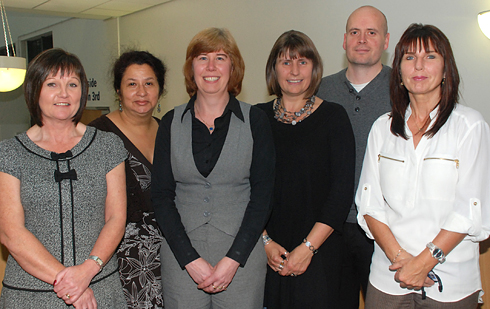Disabled students rise to the challenge
Mon, 29 Oct 2012 14:15:00 GMT
Specialist help and support attract record numbers to Huddersfield – and they do well in their degrees
RECORD numbers of disabled students are heading for the University of Huddersfield and achieving their full potential when they get there.
Aided by specialist facilities and supported by an experienced team of disability advisers (pictured below), students are overcoming problems that range from mobility difficulties to mental health issues. At the end of their studies they are scooping a high proportion of the top-class degrees awarded by the University.

pictured l-r: Sue Jones, Pam Baxendale, Andrea Faulkner, Jo Mitchell, Simon Rose and Diane McClymont
Disabled students have made up around seven per cent of Huddersfield students. But at the end of the 2011-2012 academic year they achieved 12 per cent of first class and upper-second class degrees.
“This is a significant success and a testimony to the hard work of the students and the support mechanisms put in place by the University,” said its Pro-Vice Chancellor for Teaching and Learning, Professor Tim Thornton.
The current academic year has seen further big increases in the number of disabled students – there are now 2,704. The number receiving Disabled Students’Allowance has grown by 30.4 per cent and there are 45.7 per cent more students who have received Personal Learning Support Plans, outlining the adjustments that the University puts in place for each student in contact with Disability Services.
In the video below: Senior Disability Officer Jo Mitchell talks about the successes made by disabled students at the University and the types of disabilities that the Disability Office assist with.
Most of the disabled students are regionally based, but there are many who come from further afield and even from overseas, says Andrea Faulkner, who is the University’s Head of Wellbeing and Disability Services.
She believes that the University of Huddersfield’s reputation in the field of disability support is an explanation for recruitment figures.
“For many years we have held induction sessions for disabled students and we have begun to ask why they chose to come here. A large number said that it was because of the great disability support. They had heard from other students what we do here. The fact that our disability advisers and support workers are so dedicated is also an important factor.”
The University has four of these advisors and they work closely with the learning support co-ordinators and the disability co-ordinators based in each academic school. They deal with a full range of disabilities, medical conditions, sensory impairments, Asperger syndrome, specific learning difficulties and mental health issues. In addition to ensuring access and providing specialist facilities such a fully-equipped ‘hygiene rooms’, they can make arrangements that include access to speech recognition software and for specially-trained note-takers who ensure that disabled students benefit fully from lectures.
“The issues that we deal with can be quite simple – such as arranging car parking – to some things that are more complex. We do have some difficult scenarios sometimes, but I think we can rise to any challenge,” said Andrea.
“For example, there was a student – since graduated – who suffered unexpected and inexplicable non-epileptic fits. We had to make specific arrangements for when she was working in laboratories and for a quiet place to lie down after a fit, with someone to stay with her afterwards. This also included liaison with the University’s Health and Safety department.”
Andrea believes that a high proportion of disabled students do so well in their academic work because they are used to tackling challenges.
“They have faced an uphill battle all the way through their school years and they are determined to do well,” she says.
In this video Jo explains how the University of Huddersfield can help a disabled student by creating a ‘Personal Learning Plan’ which combines the use of academic support with other support workers together with additional support equipment in each individual case.
The University’s reputation as one of the country’s most attractive destinations for disabled students could be further enhanced with the development of its new Learning and Leisure Centre (LLC). Scheduled for completion in 2014, it is intended that this building will include a fully-equipped Access Centre where the requirements of disabled students can be fully assessed on site.
The Rev Paul Wilcock, who is the University of Huddersfield’s Director of Student Services, commented that: “We are rapidly becoming the university of choice for disabled students and the new facilities at the LLC will confirm us as one of the nation’s top ten providers.”







